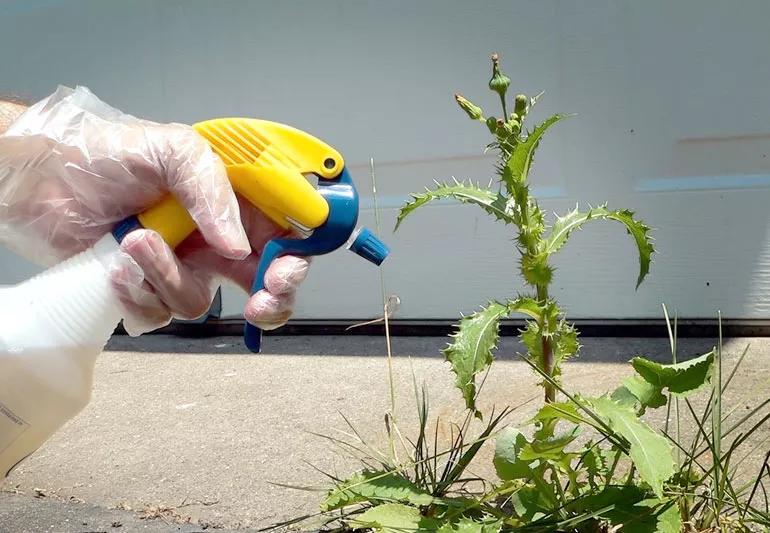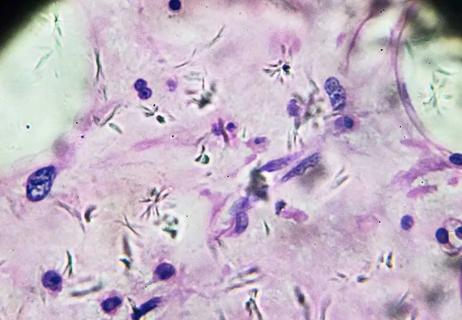Research on the controversial issue is mixed, but there are safety precautions you can take

What’s the cost of a lush, weed-free lawn? If you’re using herbicides, you may worry whether the price could be your health.
Advertisement
Cleveland Clinic is a non-profit academic medical center. Advertising on our site helps support our mission. We do not endorse non-Cleveland Clinic products or services. Policy
Squirting weed killer on dandelions and other unwanted vegetation in your well-manicured yard can expose you to some somewhat nasty stuff. Herbicides are harsh. After all, they’re marketed as a “killer” for a reason.
But can the chemicals that make weeds wither and die cause you any harm? As it turns out, that’s a controversial and much-debated question.
Let’s try to weed out fact from fiction on the topic with oncologist Dale Shepard, MD, PhD.
When it comes to weed killers and your health, much of the focus is on a chemical known as glyphosate. It has been available for weed control since 1974 and can be found in hundreds of herbicides on the market today.
Now for the debate.
Scientists with the U.S. Environmental Protection Agency (EPA) say glyphosate poses no health concerns to children or adults if used as directed. The EPA also emphasizes there’s “no evidence that glyphosate causes cancer in humans.”
That’s an assessment shared by the European Food Safety Authority and an expert ad hoc body administered by the Food and Agriculture Organization of the United Nations and the World Health Organization (WHO).
But not everyone agrees with that stance.
Some organizations and researchers believe there’s a link between exposure to glyphosate and cancer, specifically non-Hodgkin lymphoma. In 2015, the International Agency for Research on Cancer (IARC) identified glyphosate as being probably carcinogenic.
Advertisement
The IARC’s classification brought the issue into courtrooms with tens of thousands of lawsuits and an eventual agreement by an agrochemical maker to pay $10 billion to settle claims.
So, is one of the world’s most widely used weed killers dangerous? Maybe yes, maybe no.
“The weed killer story points to interesting disconnects between science, public opinion and court decisions,” says Dr. Shepard. “There’s really no clear and definitive answer.”
People who don’t use glyphosate-based herbicides very often or at all probably don’t have much to worry about. Researchers say that low concentrations of glyphosate in products for at-home use make the risk of toxic exposure minimal.
Yet there’s also a belief that landscapers, groundskeepers and farmers who frequently use the product in large and more concentrated doses might be at higher risk.
One last point, too: Research shows that detectable traces of glyphosate are becoming increasingly common in human urine samples. A 2022 report by the Centers for Disease Control and Prevention (CDC) found the chemical in more than 80% of 2,310 urine samples.
But what that means for your health remains unknown.
So, what can you do to stay as safe as possible if you’re using a chemical weed killer? For starters, follow these precautions:
Another option, of course, is to simply stop using chemical weed killers to minimize your chance of exposure. Explore other alternatives to eliminate weeds, including:
Advertisement
Learn more about our editorial process.
Advertisement

Prioritize protein and fresh produce, but be extra careful to avoid bacteria that could cause foodborne illnesses

Here’s how (and why) to ask your doctor about treatment goals, second opinions, clinical trials and more

Rates of early-onset breast, colorectal and GI cancers are increasing, but preventive care and a healthy lifestyle can help reduce your risk

The side effects of cancer and treatment can impact desire, sexual function and intimacy, but there are ways you can keep the flame going

Decisions you make regarding smoking, alcohol use, meal choices and exercise can make a big difference

Taming fear and reclaiming your future after treatment

Carcinomas are the most common and affect skin and organs

7 healthy eating tips to help reduce your risk of some of the most common types of cancer

Wearing a scarf, adjusting your outdoor activities and following your asthma treatment plan can help limit breathing problems

Your diet in the weeks, days and hours ahead of your race can power you to the finish line

When someone guilt trips you, they’re using emotionally manipulative behavior to try to get you to act a certain way